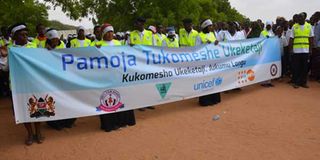Where stigma drives married women to FGM

A procession to mark the International Day of zero Tolerance to FGM in Garissa County on February 6, 2017. FGM is linked to the high number of school dropouts and teenage pregnancies in Kuria Sub-County. FILE PHOTO | NATION MEDIA GROUP
What you need to know:
Her husband’s relatives disliked her and blamed her for the misfortunes that befell them.
All this because she had refused to be circumcised as a girl.
In a community where girls must face the knife, it was unheard of.
Ms Robi Nchagwa is 40 but used to feel like an outcast until four years ago. She was labelled a bad omen in her Nyamagongwi Village, Kuria East Sub-County.
Her husband’s relatives disliked her and blamed her for the misfortunes that befell them.
All this because she had refused to be circumcised as a girl.
In a community where girls must face the knife, it was unheard of.
“I was seen as a pariah. My husband’s relatives blamed me for the misfortunes that befell the family,” she said.
According to Kuria traditions, an uncircumcised woman should not be married. Any man who marries such a woman attracts problems.
The uncut woman — derogatorily called “irikunene” — is not allowed to mingle with others, especially at social functions.
WENT FOR CUT
Ten years into her marriage, Nchagwa could take it no longer. She gave in to pressure and went for the cut in 2014.
“I was tired of being mistreated and my husband was almost marrying a second wife. I had to do it and I am now at peace with everyone though I feel it was not right,” Ms Nchagwa said.
As the world marks the International Day on Zero Tolerance for FGM, campaigners say stigma is one of the main challenges in the battle against the cut.
Ms Vera Robi, the founder of Kuria Anti-FGM and Centre for Child Empowerment, said many married women were being forced into the rite.
“Girls fear being subjected to the same situation in future and opt for the cut,” Ms Robi said.
Apart from the stigma, the community still holds on to beliefs and taboos that protect FGM. Elders wield enormous influence.
BELIEFS
It is believed that those who reject the rite are bound to face serious consequences from Eresa, the god of circumcision.
According to the belief, mysterious deaths, accidents, strange illnesses, unstable marriages, insanity and other misfortunes follow such people.
Mr Ng’ariba Mwita, an elder, said many deaths and family break-ups were linked to opposition to the cut.
“These cases are real. Those who disobey the ancestors face consequences,” he told Nation.
It is believed elders have special powers from Eresa to perform magical feats known as ‘tambiko’ to cast a spell on anyone who does not go for the cut.
Deputy County Commissioner Wesley Koech admits that the beliefs have slowed the government’s efforts in combating FGM.
“The beliefs are strong. Elders threaten those who are opposed to them,” Mr Koech said.
However, he maintained that the government would not relent in the war against FGM.
FGM is linked to the high number of school dropouts and teenage pregnancies in Kuria.





